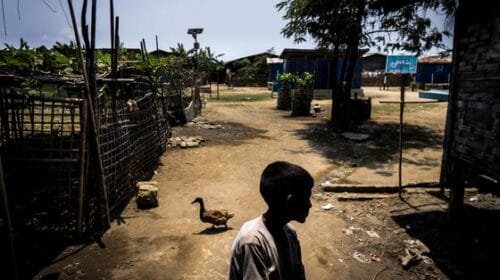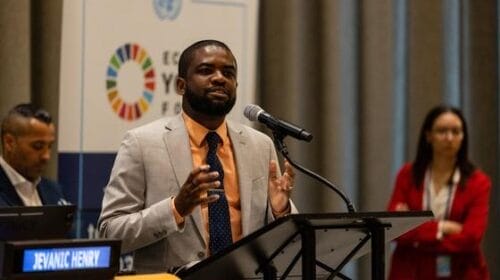Wednesday’s Daily Brief: Libya ‘war crime’ attack, Sudan, Myanmar rights violations continue, ‘xenophobia’ in Assam, South Sudan update
Deadly ‘war crime’ airstrike on migrant centre in Libya: UN calls for inquiry
An airstrike on a detention centre in Tripoli that killed scores of migrants and refugees “deserves more than condemnation”, UN agencies said on Wednesday, as both the UN High Commissioner for Human Rights and the head of the UN mission in Libya (UNSMIL), insisted that it may amount to a war crime.
In a joint call for an investigation to bring those responsible to justice, UN migration agency, IOM, and UNHCR, the UN refugee agency, spoke of the “appalling toll” caused by Tuesday’s reported airstrike on the Tajoura Detention Centre in a suburb of the Libyan capital.
Secretary-General António Guterres, said in a statement that he was “outraged” and called for a full independent inquiry on behalf of the victims.
Full details here.
Restrictions, unmet promises, unbridled violence in Sudan, a ‘recipe for disaster’, says Bachelet
After nationwide protests across Sudan on Sunday, UN human rights chief Michelle Bachelet on Wednesday called on Sudanese authorities to lift restrictions on the internet and launch independent investigations into all acts of violence against demonstrators, and allegations of excessive force, including attacks on hospitals.
“It is essential there are prompt, transparent and independent investigations into how all these people lost their lives, as well as into the causes of such a large number of injuries,” said the High Commissioner.
Full story here:
South Sudan peace deal hasn’t stopped ‘brutal targeting’ of civilians, says UN Peacekeeping report
Civilians in the Central Equatoria region of South Sudan were “deliberately and brutally targeted during a surge in conflict, the UN mission in the country, UNMISS, reported on Wednesday, despite the signing of a revitalized peace deal between forces loyal to President Salva Kiir, and to his former deputy, Riek Machar.
The report found that, between September 2018, when the deal was signed, and April this year, more than 100 civilians were killed, and almost the same number of women and girls were raped, or subjected to other forms of sexual violence.
95 separate incidents of “violations and abuses” were reported during the period. As well as the killings and sexual violence, 187 people were abducted, and 35 wounded. Some 30 villages were attacked, and the fighting led to more than 56,000 people being displaced within South Sudan, and nearly 20,000 more fleeing across the borders to Uganda and the Democratic Republic of the Congo.
However, the report shows that conflict-related violence has, in fact, significantly decreased since the signing of the deal. Central Equatoria has been the exception to this trend, particularly in areas surrounding Yei city. In response, the UN peacekeeping mission has intensified patrols within Yei and the surrounding region.
Grievous violations continue against Myanmar civilians, Human Rights Council hears
Marginalized communities in Myanmar still face “grievous human rights violations” at the hands of security forces, a UN-appointed independent expert said this week, while repeating her call for an international and independent probe into the 2017 exodus from Rakhine state.
Addressing the Human Rights Council in Geneva, Yanghee Lee warned that the international community is “beginning to overlook” the plight of hundreds of thousands of people who fled the country amid violence described as ethnic cleansing.
Story in full here.
UN experts say millions in Indian state of Assam dealing with ‘xenophobic climate’
Millions of people from minority backgrounds, in the Indian state of Assam, are living in a “xenophobic climate”, and face marginalization and a rise in hate speech on social media, independent UN experts warned on Wednesday.
The concerns raised by the group of UN Special Rapporteurs, are linked to draft amendments to the Assam National Register of Citizens, which excludes more than 4 million people from the list, in particular Muslims and Hindus of Bengali descent.
Those excluded from the final list, due to be published on 31 July, will have to prove to a tribunal that they are not “irregular foreigners”, and, say the experts, they risk statelessness, deportation, or prolonged detention.
The Special Rapporteurs added that the process may exacerbate xenophobia, whilst fuelling religious intolerance and discrimination, and called on the Indian authorities to step in and take “resolute action.”
Listen to or download our audio News In Brief for 2 July on SoundCloud:








